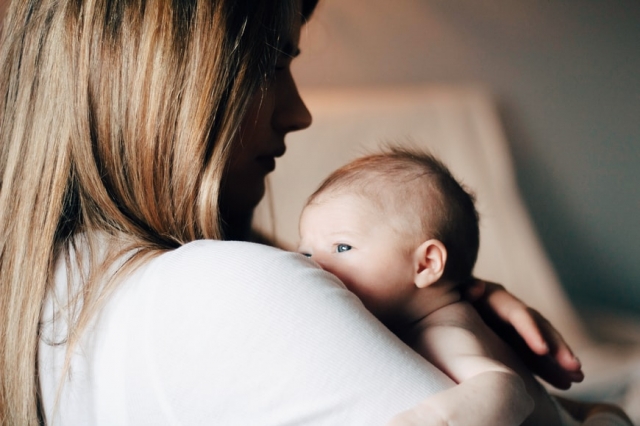Tears, sadness, anguish ... Many mothers experience baby blues after birth. But sometimes, it can be a real depression, also called postpartum depression, which must then be treated specifically.
Giving birth to a child is a radical change in the life of any new mother (even if it is not her first child). Despite the joys and the intensity of the emotions felt, it is not uncommon for a mother to feel confused, overwhelmed, and exhausted in the weeks following childbirth.
This is a fleeting situation, and the feelings associated with it affect the majority of new mothers at one time or another. However, for some, the discomfort persists and runs much deeper. According to the National Institute of Public Health Quebec, it is estimated that two in ten women are affected by postpartum depression. What is this disease?
Postpartum depression: not to be confused ...
First of all, it is important to distinguish between the “baby blues” and postpartum depression.
Baby blues
The baby blues affect 30 to 80% of women and usually occur between the 3rd and 6th day after childbirth. It causes a feeling of depression along with fatigue, tension, and an urge to cry for no reason. In the case of postpartum blues, drug treatment is not necessary; the support of relatives and caregivers is usually sufficient to make it disappear in 4 to 7 days at most.
Postpartum depression
Postpartum depression is a more serious illness that can start at any time during the first year after giving birth. It is a form of clinical depression whose symptoms resemble those of "ordinary" depression. It often occurs in women who have had episodes of depression in the past, but it is not always the case.
In addition, it is common that postpartum depression is not detected early on because the symptoms are often confused with those of the "baby blues." Thus, a mother or her relatives will usually realize a little late that the situation is getting out of control. The disease lasts from 3 months to 1 year (with the help of appropriate treatment), and early diagnosis often results in a faster recovery.
Signs and symptoms of postpartum depression
Postpartum depression is like many other forms of depression, although some symptoms are more associated with negative thoughts about the newborn baby. Signs and symptoms vary from case to case, but most are found:
- Severe sleep disorders and insomnia
- A psychomotor slowdown (difficulty concentrating, reduced alertness, memory lapses, difficulty following or participating in a conversation)
- A fluctuation in appetite
- A permanent urge to cry
- Constant fatigue
- Mental exhaustion
- An absence of joy, a feeling of being unhappy
- Difficulty in thinking, concentrating, or even acting
- Social withdrawal, isolation
- An alteration in the perception of self and others
- A feeling of being an incompetent mother, a strong sense of failure, helplessness, and ineptitude
- Guilt
- Anxiety
- A lack of interest in her or the newborn or, on the contrary, excessive concern about the baby
- Fear of harming the newborn
- Severe mood swings
- Suicidal thoughts
After childbirth, many women experience feelings of anger, sadness, irritability, and insecurity. Some may even have negative feelings about their baby, but we will talk about postpartum depression if these signs and symptoms invade the new mother over time.
Causes of postpartum depression
It is often difficult to find a specific cause for postpartum depression. On the other hand, it can be possible to isolate several risk factors present (in part or in whole) in affected women:
A sudden drop in pregnancy hormones;
A particularly laborious childbirth;
Exhaustion;
A difficult baby;
A history of depression, including prenatal depression;
Episodes of anxiety during pregnancy;
Lack of support after birth;
A difficult marital situation;
Suffering moral or physical violence;
Postpartum depression; risk factors
It is impossible to predict who will have depression after birth. However, some mothers are more vulnerable from the outset than others, especially those who have already experienced a depressive episode during or before their pregnancy.
Postnatal depression can occur when the pregnancy or childbirth was difficult, when pregnancy was unwanted or when problems arose in the baby at birth (prematurity, low weight, hospitalization).
Socio-economic factors also favor maternal difficulties: marital problems, a single mother, a period of unemployment ...
Finally, a recent stressful event, such as bereavement or marital breakdown, also has an influence.
Postpartum depression: the mother-child bond and the couple
In a relationship severely disrupted by the disease, depressed mothers are often less attentive to their child's needs and are less affectionate and tolerant. Relationship conflicts often arise from postnatal depression, and it is not uncommon for a partner to end up with a psychological problem as well. The first thing when you feel bad after the birth of your baby is to talk about your suffering and especially not to isolate yourself. Family, dad, close friends are often a great help. However, a psychological follow-up is necessary to go up the slope.
How do you get out of postpartum depression?
Seek medical help
Women are expected to be overwhelmed with happiness after giving birth, but many don't dare to admit that is not how they feel. In fact, it's common for young parents to feel depressed, confused, frustrated, and disillusioned. There is nothing to be ashamed of about that. The support of a healthcare professional can be a reassuring solution to doubts.
Speak with your primary care physician or psychiatrist to determine options for the support and treatment needed based on your needs.
Whatever you do, don't suffer in silence. If you think your partner is in pain, encourage them to seek help as well.
Asking for help from loved ones
Let them know how you feel, and don't be afraid to ask for help. For example, you could ask someone for help to take care of your child while you rest for a few hours. If you're low on energy, ask for help with shopping or cooking.
Psychotherapy
Joint therapy of mother and baby with a psychotherapist is the best solution. Therapy can last from 8 to 10 weeks. During these sessions, the therapist will defuse the conflict between mother and child, often by going back to the past and its possible conflicts with her maternal line. The therapy will allow the restoration of a mother-child relationship.
Antidepressants
Antidepressants may be recommended when depression is severe, and other treatments have not worked. Your doctor will advise you on the options available if you are still breastfeeding.
If you have a history of mental health problems or depression, talk to your doctor about it when it comes time to get pregnant. They may arrange for you to be monitored regularly by a healthcare professional for the first few weeks after giving birth.






